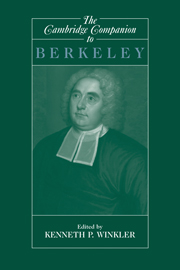Book contents
- Frontmatter
- Introduction
- 1 Berkeley’s life and works
- 2 Was Berkeley an empiricist or a rationalist?
- 3 Berkeley’s notebooks
- 4 Berkeley’s theory of vision and its reception
- 5 Berkeley and the doctrine of signs
- 6 Berkeley’s argument for immaterialism
- 7 Berkeley on minds and agency
- 8 Berkeley’s natural philosophy and philosophy of science
- 9 Berkeley’s philosophy of mathematics
- 10 Berkeley’s moral and political philosophy
- 11 Berkeley’s economic writings
- 12 Berkeley on religion
- Appendix
- Bibliography
- Index
Introduction
Published online by Cambridge University Press: 28 August 2006
- Frontmatter
- Introduction
- 1 Berkeley’s life and works
- 2 Was Berkeley an empiricist or a rationalist?
- 3 Berkeley’s notebooks
- 4 Berkeley’s theory of vision and its reception
- 5 Berkeley and the doctrine of signs
- 6 Berkeley’s argument for immaterialism
- 7 Berkeley on minds and agency
- 8 Berkeley’s natural philosophy and philosophy of science
- 9 Berkeley’s philosophy of mathematics
- 10 Berkeley’s moral and political philosophy
- 11 Berkeley’s economic writings
- 12 Berkeley on religion
- Appendix
- Bibliography
- Index
Summary
The most enduring comment ever made about George Berkeley was conveyed by Samuel Johnson to his friend James Boswell, who records it in the following story:
After we came out of the church, we stood talking for some time together of Bishop Berkeley's ingenious sophistry to prove the non-existence of matter, and that everything in the universe is merely ideal. I observed that though we are satisfied his doctrine is not true, it is impossible to refute it. I never shall forget the alacrity with which Johnson answered, striking his foot with mighty force against a large stone, till he rebounded from it, - 'I refute it thus.' This was a stout exemplification of the first truths . . . or . . . original principles . . . without admitting which we can no more argue in metaphysics, than we can argue in mathematics without axioms. To me it is not conceivable how Berkeley can be answered by pure reasoning. Johnson portrays Berkeley as a philosopher hopelessly out of touch with human life; one aim of the present Companion is to supply a portrait of Berkeley that is more rounded and more just. The Berkeley of the essays that follow is not only an immaterialist philosopher, but a human being engaged - intellectually and often practically - with central issues in psychology, education, natural science, mathematics, economic development, ethics, politics, and religion, many of which are issues of continuing importance. Immaterialism is by no means neglected: Several chapters will help the reader decide whether Johnson was right to suggest that Berkeley's denial of matter is at odds with common sense and everyday experience, or whether Boswell was right to conclude that Berkeley cannot be refuted by reasoning.
- Type
- Chapter
- Information
- The Cambridge Companion to Berkeley , pp. 1 - 12Publisher: Cambridge University PressPrint publication year: 2005
- 1
- Cited by



